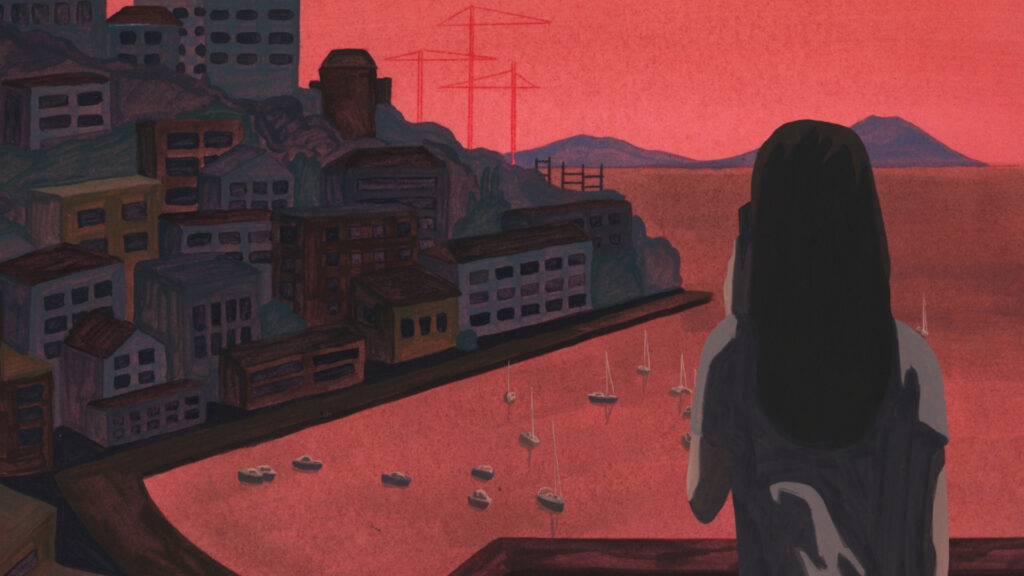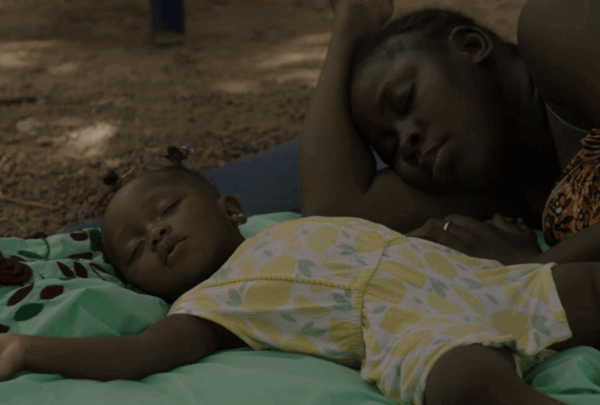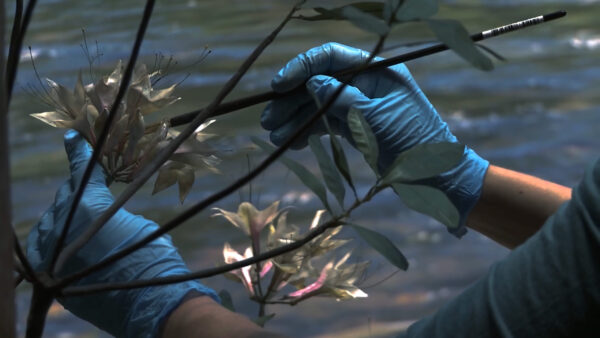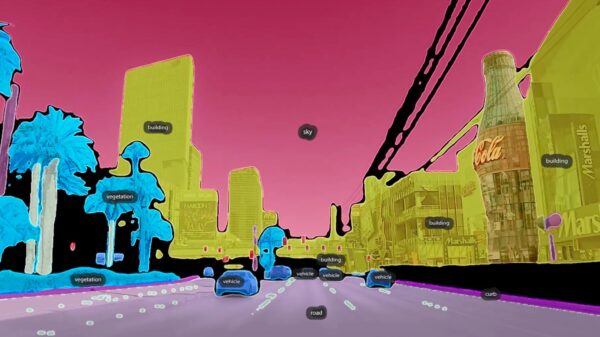Under The Volcano’s Crater
Noir-Soleil
The past is inescapable for the protagonists in Marie Larrivé’s Noir-Soleil, in which the filmmaker wants us to pay close attention to “unmoments”—seemingly unimportant short occurrences where the characters stare into space or an animal moves between the bushes.

Marie Larrivé’s fourth animated short film works in mysterious ways. Its plot is thin, easily summarised, and almost straightforward, yet that only tells little about the experience the film renders. To uncover its underlying qualities, Larrivé asks us to pay close attention to what can be referred to as “unmoments”—seemingly unimportant short occurrences where the characters stare into space, an animal is making a move in between the bushes, or black tar gradually covers the ground of a construction site. As the film unfolds, these images function as symbolic motifs through which we learn more about the characters’ emotional dispositions and, in turn, discover the true driving force of the film: the weight of the past.
As Dino, a middle-aged man, returns from a walk to his secluded cabin in the woods, he receives a call from the Italian police asking him to travel to Naples for a DNA test. They believe that a forty-year-old corpse that was recently found might be of his father. Dino takes a slow puff from his cigarette and sets off on a ship to the Italian port city. On deck, he unexpectedly meets his daughter, Victoria, who has been contacted by the police for the same reason. The two find themselves on an imposed holiday on a mission to trace their connection with the deceased man but also to unravel the toll of the years in their relationship with one another.
Despite this premise, no big secrets or appalling anecdotes would be uncovered. Larrivé navigates the story with elegance and minimalist decisions that allow her characters time to process and transform. Dino and Victoria spend a few days together, sleep in the same hotel room and share cigarettes, but they seem distant from one another for the most part, and their conversations are usually concluded with a few short phrases. It is only late in the film that Victoria asks her father what his father was like. “Very tough”, he replies and tells her about a difficult memory that has left him with a physical, and presumably emotional, scar. Something seemed to have shifted at that instant. But Larrivé does not dwell over these moments. Despite the omnipresence of the past, there is little nostalgia or sentimentality. Even throughout the film’s dramatic moments, the characters are restrained, and Larrivé often opts for wide shots over close-ups. There are also quite a lot of gaps in the story and much that we have to fill in ourselves. But altogether, these choices reinforce the emotional tension and curiosity the film builds. The less we know, the more we feel and identify with the characters.
Indeed, the past is constantly echoed throughout the film in various ways and seems almost inescapable for its protagonists. When Victoria goes to visit Mount Vesuvius, she stumbles upon ancient ruins and skeletons. The city itself is a living memory for Dino, who used to spend a lot of time there. And, of course, it was the eruption of Vesuvius, a volcano thousands of years old, which caused the earthquake that prompted the story. Old memories, hidden tension, and undiscussed emotions that have been long buried underground, now gush just like the under-earth gases and lava of Vesuvius.
For Dino, this is a struggle he would rather not face. He is reluctant to do the DNA test and repeatedly refuses to show up when he is needed. With little background story, his baggage and pain are portrayed with compassion and sensitivity, as seen through every single one of his slow moves and gestures. Yet, he is there and tries to cope with the efforts this journey requires from him. In the shadow of his father’s absence, Dino seems to be reflecting on the importance of his own presence in Victoria’s life: had he been given the opportunity, what would he have done differently? Could he repair the mistakes his father made with him through his relationship with his daughter? The film beautifully and eloquently parallels the two parental relationships that resurfaced in the past as both characters are confronted with the question of how to deal with those issues in the present.
The distinct, mysterious, melancholic atmosphere owes a great deal to the film’s beautiful animation technique. The drawings were made by Larrivé entirely with paint on paper before being digitally transformed. The result brings to mind Edward Hopper’s depictions of isolation and stillness. Similarly, in Noir-Soleil, the characters are often juxtaposed with empty spaces or wide landscapes they only fill a small part in. This makes them appear lonely and perhaps unequipped to deal with what the world has in store for them. While the script is characterised by subtle choices, the animation gravitates towards an expressive and evocative style. The palette’s wide range—from grey and pale blue to vivid colours of orange and red—offers us a possible glimpse into the protagonists’ inner emotional state, which is turbulent and constantly transforming. The original score composed by Maël Oudin and Pierre Oberkampf fulfills a primary role as well in telling the story, evoking a sense of unease and despair that grows stronger in the wait for the DNA test results.
Though they deal with it in different ways, Dino and Victoria are both defined by their relationship over the years that have gone by. To a certain degree, the DNA results could allow them to regain ownership over their clouded past and form a better understanding of themselves, not only as a family but also as individuals. Through delicate means, rich nuances, and a daydream-like pace, Noir-Soleil manages to capture the intangible feelings of loss and the repercussions of the past. As it offers its characters a chance for redemption, it sends the audience on a wonderful journey.





There are no comments yet, be the first!